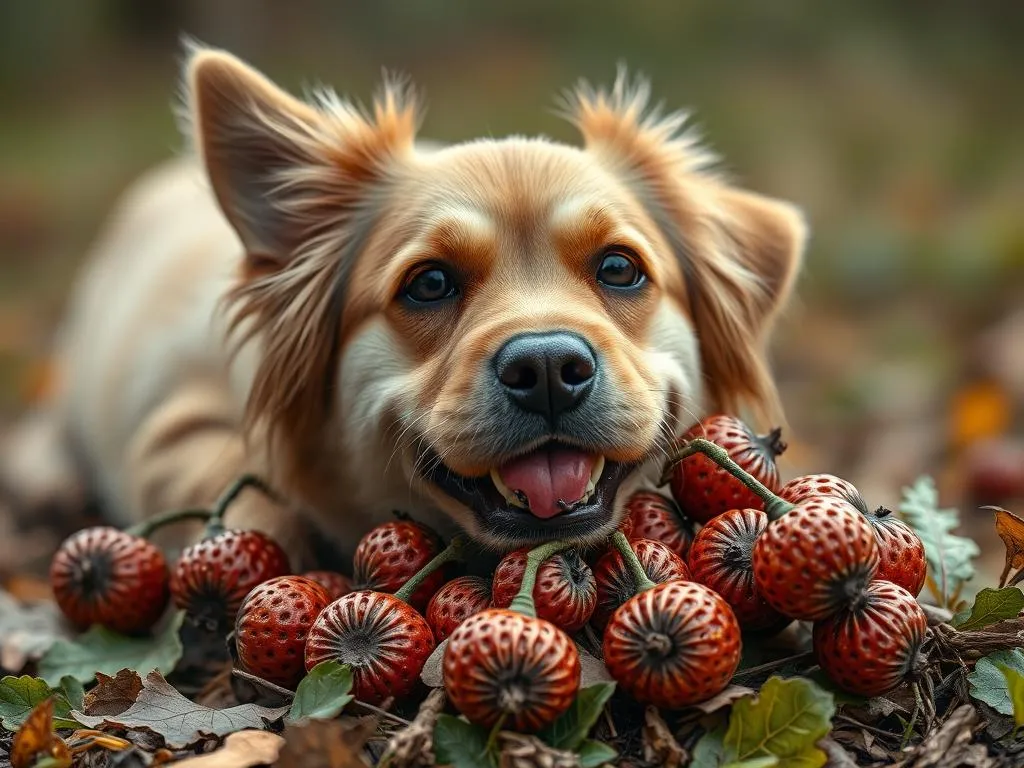
Dog health care is a crucial aspect of responsible pet ownership, and understanding what is safe for your furry friend is vital. One common question among dog owners is, are conkers poisonous to dogs? With the arrival of autumn, conkers, which are the seeds of the horse chestnut tree, often fall to the ground, tempting curious dogs. This article will delve into the nature of conkers, their toxicity, symptoms of poisoning, and how to keep your dog safe.
Understanding Conkers
What are Conkers?
Conkers are large, glossy seeds that come from the horse chestnut tree (Aesculus hippocastanum). They are typically brown and have a smooth, shiny surface. Besides being called conkers, they are also known as horse chestnuts. Interestingly, conkers are not true chestnuts; they belong to a different genus and are not safe for consumption.
Where Do Conkers Come From?
Conker trees, or horse chestnut trees, originate from the Balkans in southeastern Europe. They were introduced to other parts of Europe and North America in the 17th century. These trees are commonly found in parks and along streets, especially in temperate regions. In the fall, they produce conkers, which can be found scattered on the ground, creating a tempting playground for dogs.
Are Conkers Poisonous to Dogs?
Toxicity Overview
Yes, conkers are poisonous to dogs. They contain a compound called aesculin, which can be harmful if ingested. Aesculin is toxic to both dogs and humans, but dogs are particularly sensitive to it. When dogs consume conkers, it can lead to various health issues, and even small amounts can be dangerous.
Symptoms of Conker Poisoning in Dogs
If a dog ingests conkers, there are several symptoms to watch for, which may include:
- Vomiting: This is often one of the first signs of ingestion.
- Diarrhea: Dogs may experience gastrointestinal distress.
- Lethargy: Affected dogs may become unusually tired.
In severe cases, ingestion can lead to more serious symptoms, such as:
- Tremors: Uncontrollable shaking can occur.
- Seizures: In extreme cases, dogs may have seizures.
- Difficulty breathing: This can be life-threatening and requires immediate attention.
Factors Influencing Toxicity
The severity of conker poisoning can depend on several factors:
- Size and breed of the dog: Smaller dogs are more susceptible due to their lower body mass.
- Amount of conkers ingested: Consuming just one conker can be dangerous, but larger quantities increase the risk.
- Individual dog’s health: Dogs with pre-existing health conditions may react more severely to toxins.
What to Do If Your Dog Eats Conkers
Immediate Steps to Take
If you suspect your dog has eaten conkers, it’s crucial to act quickly. First, monitor your dog for any symptoms of poisoning. If they show any signs of distress, contact your veterinarian immediately. Providing your vet with details about the amount consumed and the time of ingestion can help them assess the situation more effectively.
Veterinary Treatments
Your veterinarian may recommend several treatments depending on the severity of the symptoms:
- Inducing vomiting: If the ingestion was recent, your vet might suggest that you induce vomiting to prevent further absorption of toxins.
- Activated charcoal: This treatment can help absorb toxins in the digestive tract.
- Supportive care: In severe cases, your dog may require hospitalization for intravenous fluids and additional monitoring.
It’s essential to follow your veterinarian’s guidance closely to ensure the best outcome for your dog.
Prevention and Safety Measures
Keeping Dogs Safe from Conkers
Preventing your dog from ingesting conkers is the best strategy. Here are a few tips for dog owners:
- Leash walking: Keep your dog on a leash during walks, especially in areas with horse chestnut trees.
- Avoiding conker areas: Be aware of your surroundings and steer clear of places where conkers are likely to be found.
Alternative Safe Play Options
Providing safe toys and activities is crucial for a dog’s physical and mental stimulation. Consider these alternatives:
- Durable chew toys: Look for toys designed for tough chewers.
- Interactive puzzles: These can keep your dog mentally engaged and occupied.
- Fetching games: Use balls or frisbees that are safe for dogs to play with.
By offering engaging alternatives, you can reduce the likelihood of your dog exploring potentially harmful items like conkers.
Other Common Plants and Foods Toxic to Dogs
Overview of Other Toxic Plants
In addition to conkers, there are several other plants that are harmful to dogs. Some common toxic plants include:
- Lilies: Can cause kidney failure in cats and dogs.
- Azaleas: Ingestion can lead to vomiting, diarrhea, and even coma.
- Sago palm: This plant is highly toxic and can cause liver failure.
Foods to Avoid
Certain human foods can also pose significant risks to dogs. Here is a list of common foods that are toxic to dogs:
- Chocolate: Contains theobromine, which is toxic to dogs.
- Grapes and raisins: Can cause kidney failure.
- Onions and garlic: These can damage a dog’s red blood cells.
Being aware of these dangers can help you provide a safer environment for your four-legged companion.
Conclusion
Understanding whether conkers are poisonous to dogs is essential for every dog owner. These seemingly innocent seeds can cause significant health issues if ingested. Regular vet check-ups and being informed about common hazards are crucial components of dog health care. If you have any concerns about your dog’s health or diet, always consult a veterinarian.
Being a responsible pet owner includes being vigilant about what your dog may encounter in their environment. By ensuring their safety and well-being, you contribute to a healthier and happier life for your beloved pet.









